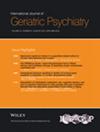The Relationship Between Caregiver Burden With Insomnia and Malnutrition in Caregivers of Older Hospitalized Patients
Abstract
Objectives
The aim of this study was to investigate among caregivers of older hospitalized patients, the relationship between caregiver burden, caregivers' nutrition, and the two most common sleep disorders—excessive daytime sleepiness and insomnia—as well as the interplay between these factors.
Method
The study universe consisted of informal caregivers of older inpatients at an university hospital in Turkiye. The sample included 100 caregivers selected through purposive sampling between March 2024-/January 2025. Data were collected on personal information, caregiver burden (assessed using the Multidimensional Caregiver Burden Inventory [MCBI]), nutritional status (evaluated using the Mini Nutritional Assessment Test [MNA] and the Healthy Eating Attitude Scale), sleep status (assessed using the Epworth Sleepiness Scale and the Insomnia Severity Index [ISI]), and muscle strength (measured by a handgrip dynamometer).
Result
A total of 100 caregivers (79% female, with a mean age of 50.5 years). Females comprised 61% of the patient population, and the mean age was 78.5 years. A significant positive correlation was found between the MCBI score and caregiving duration, ISI score, and patient age (p < 0.005). In contrast, the MCBI score showed a significant negative correlation with the MNA score and muscle strength (p ≤ 0.005). The adjusted linear regression analysis revealed that the MNA score had a significant negative effect on MCBI, while the ISI score had a significant positive effect.
Conclusion
In the present study caregiver burden was associated with poor nutrition and sleep disturbances. Thus, reducing caregiver burden may improve insomnia and malnutrition. Moreover, addressing sleep and nutrition problems in caregivers suffering from insomnia or malnutrition may contribute to a reduction in overall caregiver burden.

 求助内容:
求助内容: 应助结果提醒方式:
应助结果提醒方式:


